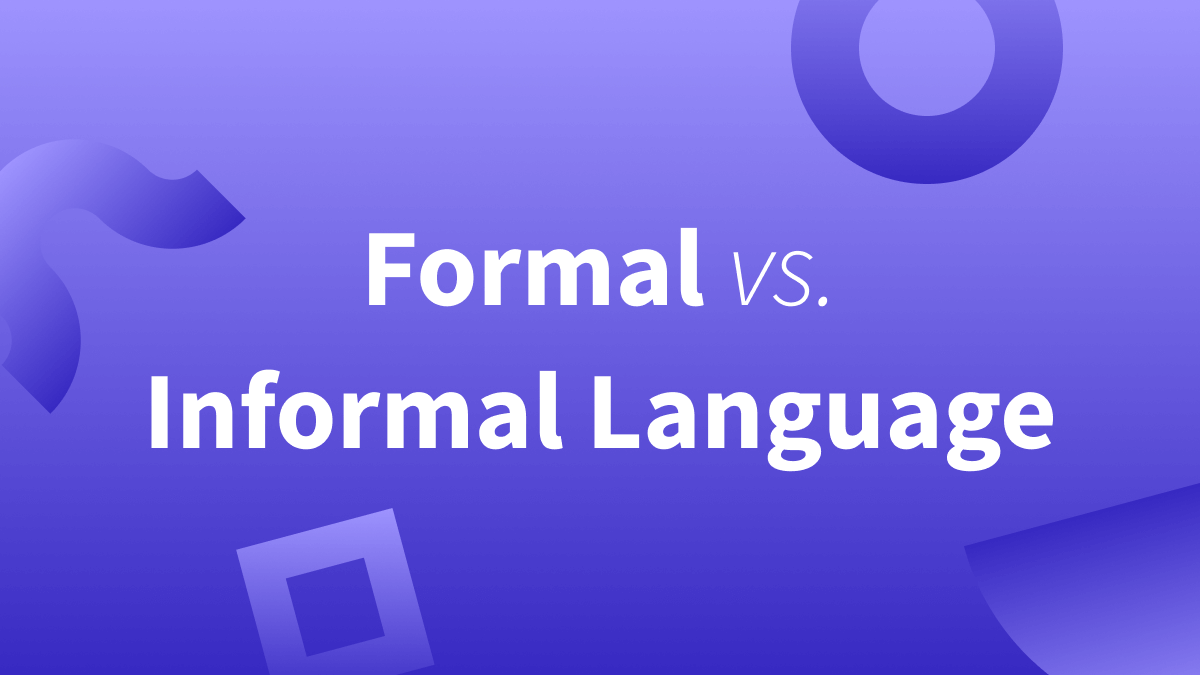Quick Summary of Formal and Informal Language
- The main difference between formal and informal language in writing is that formal language is more rigid and less personal, whereas informal language is more easygoing and adaptive.
- Deciding on using formal or informal language depends on what you’re writing and who you’re writing it for:
- Formal language is usually reserved for professional and academic settings, while informal writing is used for more casual settings, like friendly text messages and creative writing.
- There are many differences found in formal and informal writing. One of them is that contractions shouldn’t be used in formal writing, but are acceptable in informal writing.
- Vocabulary is another major difference between formal and informal language.
- ○ Formal: They should not expect to recognize the changes immediately.
- ○ Informal: They shouldn’t expect to see the changes right away.
Formal vs. Informal Language
Effective writing has a lot to do with not only what you write but also how you write it. The type of language you use—formal or informal—must suit your audience and setting.
If you want your message to resonate, then it wouldn’t be a good idea to use colloquialisms in formal settings. Similarly, you shouldn’t use rigid language when you’re writing about something light, playful, or funny.
But what exactly is the difference between formal and informal language in writing? That’s what we’ll be covering in this blog. We’ll also provide helpful examples so you can better recognize the difference.
Plus, we’ll show you a paraphrasing tool that’ll ensure your text is pristine, regardless of what you’re writing.
Let’s begin!
What Is The Difference Between Formal and Informal Language?
Compared to formal language, informal language is considered more casual. Informal language also evolves much more rapidly than formal language. While new words or phrases can be introduced to informal language seemingly overnight (e.g., GOAT referring to the greatest of all time), these changes can take years in formal language (e.g., you replacing thou, thee, and thy).
But there are also more notable differences between formal and informal language. We’ll give some examples below.
1. Contractions
It is advised to avoid contractions (shortened versions of words) in formal language, but they’re acceptable in informal language.
Unfortunately, the team could not replicate the results.
(Formal)
Unfortunately, the team couldn’t replicate the results.
(Informal)
2. Colloquial Phrases/Slang
Formal language is also marked by an absence of colloquial phrases and slang (words or phrases that are common only in everyday speech), but are typically used in informal language.
Everyone was disappointed.
(Formal)
Everyone was bummed.
(Informal)
3. First-Person Pronouns
Generally, first-person pronouns (like I and we) are avoided when writing with formal language. However, it’s accepted (and expected) in informal language.
The students were asked to fill out the questionnaire.
(Formal)
Informal: We asked the students to fill out the questionnaire.
(Informal)
4. Phrasal Verbs
When using formal language in your writing, it is also recommended to replace phrasal verbs (proper verbs that are followed by one or more prepositions and act as a single verb).
It was something the protestors could endure.
(Formal)
It was something the protestors could put up with.
(Informal)
5. Grammar Rules
When writing for formal settings, it is recommended to follow all grammar rules, even those that are considered trivial. In informal settings, some grammar rules can be ignored. For example, in informal settings, it’s okay to use who in place of whom. However, always using who in place of whom is not recommended when writing with formal language.
Whom do I have to speak to?
(Formal)
Who do I have to speak to?
(Informal)
6. Vocabulary Choice
Formal language tends to use longer, more complex vocabulary. Sometimes it is not recommended to use this type of vocabulary with informal language (depending on what you’re writing) because it can confuse or distract your audience.
They needed assistance while recovering from the outcomes of the hurricane.
(Formal)
They needed help while recovering from the effects of the hurricane.
(Informal)
Bonus Tip
Whether you’re writing in a professional or academic setting or a casual and creative one, LanguageTool can provide stronger vocabulary options—all you have to do is double-click on the word. This multilingual spelling and grammar checker can also detect different types of errors, whether you choose to write in formal or informal language.
Deciding When To Use Formal and Informal Language
Remember that choosing when to use formal or informal language in your writing depends on what you’re writing and who your audience is. However, you should also be mindful of the fact that formal and informal language is a spectrum, and some types of writing can fall in between these categories. Regardless of what type of language you’re using in your writing, keep these differences in mind to guarantee the most effective writing possible.

